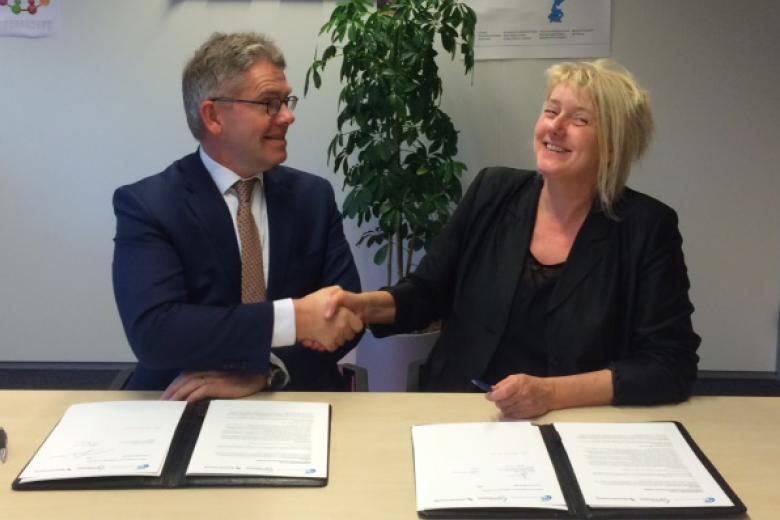Dr. Jessica Alleva awarded for her work on improving body image
In January Dr. Jessica Alleva, from the Department of Clinical Psychological Science at the Faculty of Psychology and Neuroscience, was honoured twice for her work on improving body image. She received the 2016 Seymour Fisher Outstanding Body Image Dissertation Award and the Distinguished Women Scientist Fund 2016 (she is the first UM researcher to receive these honours).
During her PhD Jessica posed the question “How can body image be effectively improved?” She was inspired to create an intervention that trained participants to focus not on their physical appearance, but on their body functionality. Body functionality concerns everything that the body can do, including functions related to health, movement, bodily senses, creativity and communication. Participants were assigned three writing assignments in which they described the functions of their bodies and why they are personally meaningful.
She found that this intervention had a positive effect on the participants’ body image. After receiving a Rubicon grant she started to investigate how the intervention works, by testing potential underlying mechanisms. Early 2016 Jessica spoke in depth about her research topic, at the bottom of this page you can read her full explanation of her research project.
I sat down with Jessica and we spoke about the recognition she received and what’s next on her agenda.
You are the first researcher at Maastricht University to be awarded the Distinguished Women Scientist Fund, how does that feel?
“I didn’t know that beforehand, but it’s quite an honour. It’s pretty amazing being the first UM researcher; I certainly hope I’m not the last one! It’s great that the LNVH supports women in science, and I’m excited that they chose me to do so.”
How will you be using the funds?
“During my PhD and Rubicon research I acquired a lot of written material from participants’ writing assignments, but at the time I only focussed on quantitative improvements in body image over time. I did not analyse the written, qualitative data. For this project I want to look at all the information that can give insight into the underlying mechanisms of the intervention and what people think, and feel, about body functionality. I want to learn how to analyse this data and what we can gain from it. I’m trained in quantitative analysis, but now it is time to focus on qualitative analysis too.
I will use the Distinguished Women Scientists Fund to visit a research group in Gothenburg, Sweden for 10 days. Prof. Ann Frisen and her colleagues are experts in qualitative analysis within body image. We will work on the project together and hopefully we’ll build lasting ties between our faculty and the University of Gothenburg.”
Will the Seymour Fisher award also go towards this project?
“I’m also running a study with some of my master’s students, for which I also wrote a Veni-proposal. I’m hoping to use the money to fund that study. Getting the Veni-grant will be very difficult, I heard about 500 people applied, so if I don’t get it, I’ll have to try again next year.
That study is about death reflection and body image, a bit morbid, but throughout my PhD I’ve been interested in death psychology and what happens when people think about their own death. There is a lot of research showing that when people think about death, it leads to negative consequences: For example, they become greedier, and they shut out people with different beliefs from their own. On the other hand there is research showing that confronting death leads to positive outcomes: ‘I dislike my job and life’s too short, so I’m going to do something I’m passionate about,’ or they realise the importance of kindness towards others.
There are theories explaining why thinking about death can lead to two different outcomes, my idea is to test those theories as applied to body image. Thinking about death in the right way could make you more appreciative of the body that you have. Being confronted with the fact you’ll one day die may lead people to think: ‘I don’t mind as much if I’m a size 0 or 6,’ or ‘appearance isn’t that important compared to family and other aspects of my life.’ I want to research in which cases thinking about death leads to growth in terms of body image, versus when it leads to an increase in the internalisation of the beauty ideal (‘life is short, I want to look as beautiful as possible’). On the basis of that research I want to develop an intervention where we train people to reflect on their own death in a constructive, positive way that leads to body image improvement.”
Background
Body Image: An International Journal of Research annually recognises an outstanding doctoral dissertation on the topic of body image. The award is named for the late Dr. Seymour Fisher, whose scholarly contributions to the field were both seminal and prolific. The recipient is awarded a monetary prize of $1000, provided through the generous endowment of Seymour Fisher’s loving family in support of continued body image scholarship in his memory. Read more
In 2012 the Dutch Network of Women Professors created the Distinguished Women Scientists Fund, a travel grant (max. 1500 euro) for female postdocs - up to 3 years after promotion and working and residing in the Netherlands - who wish to travel abroad in the framework of their discipline. Read more
Early 2016 Jessica spoke in depth about her research topic
During my PhD, my research was mainly focussed on: how can we get people to feel more positively about their bodies? Most research shows that about half of all women, and a third of men, are unhappy with their bodies. Having this negative body image affects many different aspects of physical and psychological health. Then I looked at what the existing interventions are for body image and whether they are effective. What I found was that they have a very small effect on body image, not really noteworthy.
Much of the literature and what we hear from people is focussed on body-image in the sense of appearance. They were focussing on aspects such as: muscularity, weight and body shape. But your body is also what it can do, the functionality: writing, dancing, hugging, painting or biking to the university. So what if we help people focus on that enormous aspect of their body, rather than just the appearance?
We developed an intervention that focussed on training people to start thinking more about body functionality than appearance. It consisted of three writing assignments in which they would describe aspects of their body-functionality and why it was personally meaningful to them. We found that this intervention led to improvement in body satisfaction and body appreciation. They also learned to view their body not as an aesthetic object, but as something functional and dynamic. The effects lasted until follow-up, one week after the intervention. The Rubicon project will build on that idea. This seems to be a promising approach for intervention, that hasn’t been done before. But why does it work?
In a first study we want to investigate two potential underlying mechanisms. One of those is that focussing on body-functionality can increase the complexity of your body-concept. Self-complexity is a mechanism that was discovered in the area of Social Cognition, it showed that some people see themselves in complex terms, for example: I work at UM for the M&C department; I’m also a runner, a chef, a boyfriend, I am all of these aspects. But someone with a low self-complexity will think: I am a UM employee and I run. This research has shown that the more complex you see yourself; the more resilient you are to stress. For example: if you would lose a marathon, it would be more stressful to the second person, because it is a major part of how they see themselves. The first person will be less affected, because it is a smaller part of a complex self-image. In our project we will apply this to body-image. Most people see their body in low-complex terms (weight, shape). If you have a more complex view of your body (taking in aspects of body-functionality, such as health and creativity), it may make you more resilient to body related stresses. These people will be less affected when they, for instance, flip through a magazine and see very thin women. They could think: I may not be a size zero but I have all these other aspects of my body that are very important to me.
The second mechanism we want to investigate is body-self-integration. That is mainly based on research showing that women tend to self-objectify. They see their body as an aesthetic object, from an outside-observer perspective and separate it from themselves. Seeing your body this way is also related to negative body image and eating disorders. It also happens that people with chronic pain see a split from their body; they see their body as an obstacle. They see their body as a sort of monster that is keeping them from who they want to be. So I started to think that maybe focussing on body functionality will integrate your body-concept with your self-concept. It’s a bit abstract, but what I noticed was that people often said things like: thinking about my body functionality makes me realise how important my body is to who I am, my body allows me to express myself. We think that the intervention will also increase body-self-integration.
Our first study will do this intervention in a group of women with a negative body image. The second study will apply the same intervention to women with rheumatic disease, who have chronic pain. In this group I want to see them focussing on what their body still can do instead of what it can’t. We think we can increase the complexity of their body-concept, and maybe we can also re-integrate their body-concept with their self-concept. This has never been investigated before in women with chronic pain. Research has only shown the negative effects of chronic pain on body-image, but nothing has been done about it, yet.
Also read
-
Dr. Benedikt Poser and his team reel in the NWO Investment Subsidy Medium grant (MaGW)
Last week Dr. Benedikt Poser of the Department of Cognitive Neuroscience (CN) at the Faculty of Psychology and Neuroscience (FPN) received word from the NWO (Dutch Organisation for Scientific Research) that his team received the NWO Investment Subsidy Medium grant (MaGW) from the NWO’s division of...

-
Centre of Expertise for Inclusive Labour Organisation (Expertisecentrum Inclusieve Arbeidsorganisatie)
On 7 December 2016 the UWV and Expertisecentrum Inclusieve Arbeidsorganisatie (CIAO) signed a cooperation agreement for the duration of 4 years. The CIAO is housed at Universiteitssingel 40, Maastricht University.
